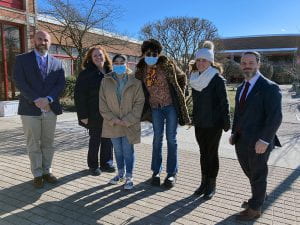Amplifying student voice has been a shared priority among South Orangetown schools for some time. Throughout this school year, District communications are highlighting the various avenues through which our students are taking on leadership roles to enhance programming, operations and school culture.
Last month, members of Tappan Zee High School’s Genders and Sexualities Alliance met with building and District administrators to ask about existing supports and suggest recommendations to further promote a welcoming, inclusive culture.
“It was definitely very useful,” said GSA President Karine, a senior. “For administrators to come to our club and have a genuine conversation, it was pretty important. It felt like we were heard and we listened to the information they shared. It felt like we had a mutual understanding.”
Administrators responded to questions on topics ranging from editing student records in PowerSchool to training for substitute teachers. “This is an important conversation and one I was glad to be a part of,” noted Principal Rudy Arietta, who was joined by Assistant Principal Melissa Luciano, Assistant Superintendent for Pupil Personnel Services Karen Tesik, Ed.D., Director of Staff Relations Joseph Lloyd, Ph.D. and Director of Data, Assessment and Accountability Jeanne Corcoran.
Under New York State Law, students have the right to change their gender and preferred name in school student management systems. Parents are able to view their child’s complete record until the student turns 18; however, only preferred names and gender are displayed to staff.
“The PowerSchool conversation was really important,” said Ed, a junior and GSA member. “It matters that students can self-identify in terms of how they’d like to be addressed and have that respected.”
“Some people don’t feel comfortable with assigned gender and names at birth. Trying to figure out a way to fix that is meaningful,” observed Karine. “It makes you feel like you are your own person and there’s no fear. It’s scary for people who can’t come out. Even though students can edit these fields in PowerSchool, not everyone can take advantage of it because they feel judged by peers or teachers or not safe at home.”
Although class rosters generated in PowerSchool only include the preferred names and genders of students entered into the system, GSA members expressed that there have been some challenges with substitute teachers.
Arietta informed students that the high school has partnered with CANDLE to train all staff during Superintendent Conference Days this year on basic vocabulary and topics around gender identity and sexual orientation.
“Our staff has been asking for professional development to better support our LGBTQ+ students,” he said. “We had two educators train half of our staff–teachers and school support employees–in December; they’ll return in March to train the remaining half. With support from the District’s Staff Relations Office, we’ll be extending this training to our substitutes as well.”
“It helps get students to school in the first place. It makes a difference to be able to walk into a safe space and you don’t feel attacked or judged for who you are. Not feeling judged in a school environment is very important,” asserted Karine. “A big part of that is communication: training staff on how to address a slur or when they see someone treating someone else badly for who they are or who they love. It’s not enough to just say ‘don’t do that’–we need them to educate students about why it’s wrong.”
“As important as it is for students to respect each other, it’s also important that teachers get training so that these topics are normalized,” Ed explained. “Students may already feel uncomfortable about speaking up about how they wish to be identified and it would make a huge difference to just hear ‘OK’ and not have it be a big deal.”
Administrators also noted that the District has been engaged in other efforts, such as reviewing and revising aspects of its data collection and communications to be more inclusive of diverse identities and family structures.
Students reported that the GSA itself, advised by teacher Kristen Driscoll, is a valued resource.
“My old school didn’t have a GSA and there were people who had things to say about people who were gay or trans,” said Ed, who is new to the District this year. “In general, I feel much safer at this school. Most of my friends here are GSA members. It’s more comfortable coming to school when people like you as you are.”
Karine discovered the club during hybrid learning last year. “It was such a weird time and I felt like I had found a community of open and kind people. It was a safe space to be who I am with people who have the same experiences and can relate,” she reflected. “When you don’t have community or feel welcomed, it feels like pure isolation from everyone and everything. There may be people all around you, but you’re just on your own. You feel very alone in the world.”
For this reason, Karine and Ed are committed to promoting the GSA more widely through the high school as a “safe space for people who don’t necessarily think this is a safe place to be.” The GSA meets on Tuesdays once a month. Students can check the club listings outside the main office for meeting dates or reach out to Driscoll for meeting information.
“Making people feel heard, supported and loved no matter who they are goes a long way,” noted Karine. “Making them feel less alone in our community goes a long way.”
Students and family members seeking community-based LGBTQ+ support and resources are encouraged to reach out to CANDLE Rockland or the Rockland Pride Center.
